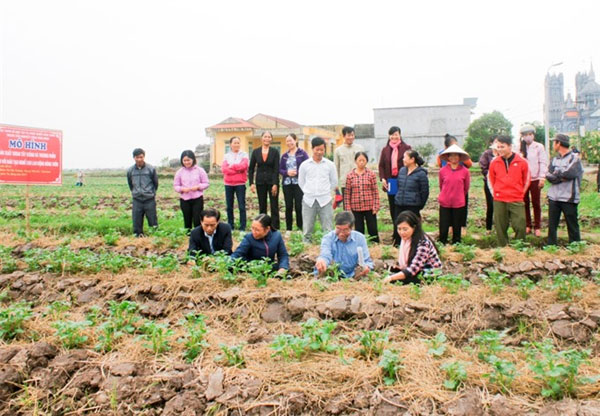[ad_1]
VietNamNet Bridge – Nguyen Thi Hoang Yen, deputy director of the Department of Co-operatives and Rural Development under the Ministry of Agriculture and Rural Development, speaks to the newspaper Nong thon Ngay nay (Countryside Today) about the work of training professional farmers in Vietnam.
 |
What has the Government aimed to do for rural workers in the last six years?
In the period from 2011-2017, some 1.6 million rural workers benefited from the Government’s project to support farmers to attend primary agriculture farming courses. More than 80 percent of the trainees were able to find jobs or establish new co-operatives or enterprises.
In the year 2009, just about 28 percent of farmers received technical training. By 2016, the percentage of farmers attending technical training courses increased to 53 percent.
However, from 2009 to 2015, the number of people who work in farming dropped to 44 percent from 51.5 percent.
By attending those training courses, the farmers learned technical skills to improve their farming productivity and to ensure social security. As a result the percentage of poor farming households dropped considerably while the percent of rich farming households had been increased.
What were the challenges in organising such courses for the farmers?
I’m sorry to say that the project has failed to achieve its target for giving occupational training to farmers in the six years from 2011-2017. We only achieved 91.5 percent of the target in occupational training for the farmers; and 82 percent of the target in the training of agricultural occupations.
The percentage of rural farmers attending the training courses was not evenly distributed nation-wide. In the midland, the northern mountainous provinces or the Central highlands, farmers attended the training courses at much lower rates than those in the delta.
In my opinion, some of the content contained in the training courses were not relevant to the actual farming practice in their real life. Particularly the topics of high-tech agricultural production in the context of climate change
Last but not least, the lack of funds to invest in the expansion of their production has become a main hurdle for many farmers after attending such courses.
Does your department have any plans for future training workshops?
The process of economic transition in our country is taking place rapidly and it has strong impacts on the structure of our labour force. As a result, whether we want it or not, we have to restructure our labour force with the goal of ensuring people can access high quality jobs.
Of course, we need sufficient funds for organising training workshops for farmers, particularly in disadvantaged areas. Of course, the training workshops will be arranged and organised at the grassroots level, based on the demand of each locality or region.
The MARD considers the work of technical training for farmers to be of great importance as it is a driving force in the course of restructuring the agriculture sector and the national program of building new rural areas.
Regarding the budget for the training, we’ll use the State budget and financial resources mobilised from different economic sectors, including non-governmental organisations, business enterprises and others.
Source: VNS
| related news |
[ad_2]
Source link
